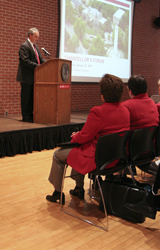Strategic Listening
Questions about reorganizing graduate studies, expanding student support services and reducing faculty and staff positions dominated the chancellor’s strategic plan forum Thursday.
Chancellor Randy Woodson said the plan, which will be shared in draft form by late February, will focus on core principles: academic strength, world-class research and quality education at an affordable price.
“We want to do everything we can to assure that we’re a strong university going forward by thinking strategically.”
Graduate Studies
History Professor David Zonderman asked administrators to carefully consider proposals that would reduce the number of graduate fields, reorganizing them into broader areas to encourage interdisciplinary work and flexibility.
Zonderman said he sees potential for research collaboration but worries about the market for a doctorate in humanities instead of in a specific discipline like history. “We don’t want to have an intellectually exciting degree that you’re not going to get a job with.”
“We’re very aware that one size does not fit all,” said Barb Sherry, co-chair of the Graduate and Postdoctoral Program Development task force. “In life sciences it might work well, but for other disciplines, it will not.”
Student Success
Given a possible reduction in the university’s state funding of up to 15 percent or $80 million, several participants asked how plans for improving undergraduate student services could be achieved.
The Undergraduate Student Success Task Force recommended professional advising for all incoming students, an expanded Summer Start program, a mandatory First Year Inquiry course and more living and learning communities. Eventually, all undergraduates would be required to complete one of five types of high-impact courses: study abroad, service learning, capstone projects, undergraduate research and internships or co-ops, said co-chair Jo-Ann Cohen.
Provost Warwick Arden, who called improvement in retention and graduation rates “absolutely critical,” said the changes would have to be made over time. The six-year graduation rate, he noted, is 71 percent. “We do OK, but we’re not where we want to be,” he said.

Work in Progress
Along with strategic planning, budget preparation and efforts to streamline business services are under way, raising questions about layoffs and consolidation of academic units.
Several participants urged administrators to be mindful of the contributions of staff members, who would have a key role to play in carrying out task force recommendations such as expanding student services.
Arden, who said he had to be blunt about the importance of faculty positions, noted that the university has had 45 percent growth in graduate enrollment while tenure-track faculty numbers increased only 10 percent. “We are going to have to pay a lot of attention to the balance of personnel here at the university here as we move forward.”
While a business services reorganization could begin this spring, changes in academic programs would be phased in over time, Woodson said.
“This is not about closing out programs and cutting faculty. It’s about keeping the university strong for the future.”
Faculty and staff can share comments through the strategic planning Web site or in person.
- Categories:


